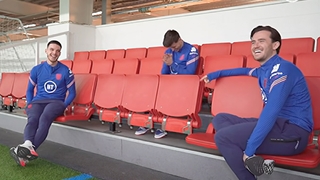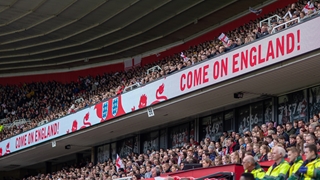
Gareth Southgate believes there is a different type of English player being developed – one who is better equipped technically and tactically - and the 2018 World Cup in Russia is the ideal opportunity for his squad to showcase what young English players are capable of.
“We’re not sure what is possible with this group yet, because so much is ahead of them,” explained Southgate, who was speaking about coaching and the influence of St.George’s Park ahead of departing for Russia.
“These young players have got a real hunger to get better and a desire to do well for England – that’s not only with the players in the senior team, but those in the age-groups beneath, so it’s a really exciting period.”
Looking back on his time in charge of the senior team, Southgate feels there have been three main parts to his role: England manager, joining up the age-group teams and the ambassadorial aspect involved in connecting the game to the country.
It is the second of those three points that the 47 year-old believes could prove exciting in Russia and beyond.
“There’ a real consistency in how we work and a continuity in the thinking and thought processes of everyone at St.George’s Park – so we’re really looking forward to the tournament to showcase what young English players are capable of.”
Southgate himself has benefited from the clear development pathway, stepping up to lead the senior team after three years as U21 head coach. He says the experience gained coaching the younger players made the transition easier.
“The challenges are exactly what I had at U21 level: getting your messages across as quickly and as simply as possible. Because of the pathway from U21 head coach to senior head coach, it has made it a lot more comfortable to make that transition.”
During his time with the U21s, Southgate developed his understanding and experience of coaching international football – particularly with styles and systems of play.
Talk of tactics enlivens the England head coach who clearly enjoys the intellectual side of the game.
“In my time here with the teams we’ve played some really good football in terms of tactics and formations,” he added.
“Predominantly, when I started with the U21s, it was 4-2-3-1 for a spell. Then in order to get our best players on the pitch, we played with a diamond for an 18-month period when we won the Toulon tournament a couple of years ago. Now we’ve moved to three at the back with the seniors.
“That part of the game [tactics] has always fascinated me – I’ve played under coaches who have experimented in different ways.
“Essentially you’re trying to get your best players on the field in a formation that allows them to play at their very best and allows you to win matches – because sooner or later you have to win games. We’re trying to balance style of play with winning football.”
Southgate believes England’s search for style and success will be helped by a ‘different’ type of England player progressing through the age-group teams – one who is both technically and tactically equipped for the international game.
“At all of our age-groups now there’s a requirement for the players to enter into tactical discussion. The young players coming through academies get that more than ever before.
“We also have to acknowledge the influence of some European and South American coaches coming to our country who have broadened our horizons and given us different ideas. That’s in addition to young English coaches recognising that these are areas that we needed to improve in.
“I think coaching in this country is progressing at a rate of knots because of the influences that we’re being exposed to and that can only be positive for players.”
As part of his weekly scouting duties, the former Middlesbrough man is afforded regular opportunity to watch the best teams in the country.
And studying the coaches currently plying their trade in the Premier League has been something he has relished.
“There’s obviously a focus on individual players and then a more broader perspective of what the two teams are doing with and without the ball.
“If you split the pitch into three you can look at: how are they pressing high up the pitch, how are they defending in the middle third and how do they defend their box.
“Equally, with the ball, how do they build from the back and what are their movement patterns that link to their tactical formation.
“We’ve got some of the best coaches in the world working in our league so there are some fascinating ideas.
“The more you watch a team, the more you start to see familiar patterns of play and how they build up – it’s a privilege really to watch those games and watch the different formations and systems against a different system. The season has been a great contrast of styles and philosophies.”
Southgate believes that the Three Lions’ style of play at international level has been developing for a number of years and is starting to filter through the football pyramid.
“Although our results in the last two major tournaments haven’t been what we hoped, we’ve ended up with higher and higher percentages of possession in those games – 15 or 20 years ago that may not have been the case.
“Now we definitely have some players who are technically as good as any around the world. We’ve seen that at all age-groups – there’s a different type of player coming through.”
Affording time for the development of individual technique and skill – both strengths and areas to improve – continues to be an area of focus for Southgate and his staff.
“There are times in the season when you might not have time to work individually on repetition and skill acquisition.
“So, every now and then, there’s the opportunity to put a session into the programme that looks at a movement pattern that might expose an opposition defence or different technical finishes.
“When you have somebody in that specific role they can go into that little bit more detail when they’re working with that player – it could be looking at the stride pattern running into a shot or other observations that can help the individual.”
Additional one-to-one and unit sessions helped Southgate during his own playing career, which saw him captain Crystal Palace, Aston Villa and Middlesbrough, as well as gain 57 England caps.
“I was very fortunate to have a coach called Steve Harrison, who worked with me at all three of the clubs that I played for. He very much had a focus on defending and defenders.
“Quite often we would go back out as a back four on a Thursday afternoon and work on individual pieces of defending and our collective defending and it definitely had an effect on the way we worked and my performance as a player. I definitely saw the value in it.”
Southgate believes the current generation is no different and welcome the small details that can make them better.
“Generally speaking all players enjoy individual conversations and feedback. They recognise that there are team things to be discussed and areas the team need to work on.
“But, if you can highlight areas that they’re doing well in, or you can highlight areas to make them individually better, then top players are like sponges and want to hear those ideas. They like to be stretched and they like to be challenged in the right way.
“There’s no question whether it’s on the grass or sitting with a laptop in a one-to-one discussion, that the individual work is really helpful and really powerful.
Although he would rather keep the talk to his group of players and staff, the significance of the next month to his own career is not underestimated.
“To have the honour of playing for my country in a World Cup was my proudest moment as a player, now to be able to manage and lead your country into a World Cup is even more special.
“I’m aware of the privilege and honour of it but, more importantly, I’m excited by a young team that is improving.”











